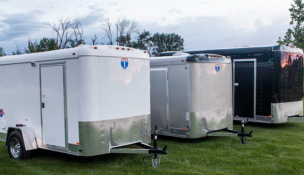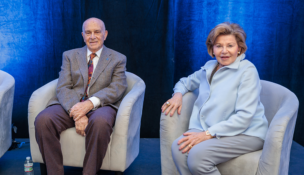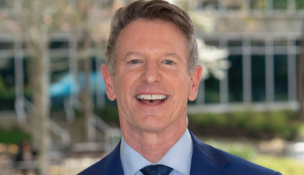PharmaVille
Richmond, Petersburg partner to build national pharma hub
PharmaVille
Richmond, Petersburg partner to build national pharma hub
A coalition of public and private sector partners is hoping to write a new chapter for Central Virginia — and ultimately the country — in its mission to fight drug shortages and create low-cost medications.
Anchored by wet labs and research and development in Richmond and manufacturing in Petersburg, the Alliance for Building Better Medicine aims to develop a nucleus of advanced pharmaceutical production to address shortages of critical medications, an issue that impacts health care as well as national security. Members include nonprofits, city governments, pharmaceutical manufacturers and Walmart Inc.
Driven by financial and logistical incentives, cheaper labor and fewer regulatory requirements, pharmaceutical manufacturers started taking their production capabilities abroad decades ago, according to a March staff report from the U.S. Senate’s Committee on Homeland Security and Governmental Affairs. Nearly 80% of the key materials used in pharmaceuticals — and generic drugs in particular — are manufactured outside the U.S., primarily in China and India. The COVID-19 pandemic exposed not only vulnerabilities in that medical supply chain but also the risks of relying on suppliers from overseas and especially from a rival superpower like China.
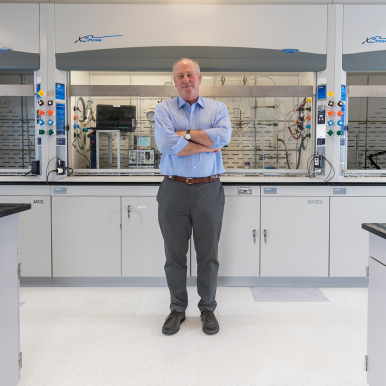
Critically needed generic drugs are especially at risk. Sterile injectables used in hospitals and supportive care medications, sedatives and chemotherapy drugs are more than twice as likely to be subject to shortages than oral medications and topical products. More than 130 drug shortages were listed on the Federal Drug Administration’s website in July. Shortages impact patient care, leading to potential errors, the use of less effective drugs, drug rationing or delay of treatments.
“If we do this correctly, we will become the epicenter for advanced pharmaceutical manufacturing in the United States,” says Frank Gupton, CEO of the Medicines for All Institute at Virginia Commonwealth University’s College of Engineering in Richmond, where he is also a professor. Gupton’s work in pharmaceutical manufacturing processes is at the heart of the Alliance’s mission.
The effort has inspired collaboration and attracted significant private and public funding. In September 2022, the Alliance for Building Better Medicine was awarded a $52.9 million grant through the Build Back Better Regional Challenge, an initiative from the U.S. Commerce Department’s Economic Development Administration intended to spur advanced manufacturing and biotechnology. The Alliance was one of 21 coalitions chosen from 60 finalists nationwide.
The Alliance’s goal is to secure the nation’s supply of quality affordable essential medicines by returning manufacturing to the U.S. while growing the regional economy. The grant money is targeted for six component projects in or around Richmond and Petersburg that will fill fundamental gaps and strengthen existing assets in infrastructure, workforce, supply chain and innovation. Public and private partners committed an additional $13.6 million to the initiative.
Chandra Briggman, president and CEO of Activation Capital, an accelerator arm of the Virginia Biotechnology Research Partnership Authority, calls the grant “transformational.” Activation Capital, an Alliance member, has been an incubator and early investor in the initiative and led the work that went into the Build Back Better award, from which Activation Capital received $15.8 million to build additional lab space in downtown Richmond.
There’s a lot at stake, Alliance members say — and failure is not an option.
The CAMPUS
Located near the intersection of Interstate 95 and U.S. Route 460, a Petersburg industrial park is home base for the manufacturing side of the regional cluster. Later this year, Mayor Samuel Parham says, the park will be rebranded as the Coalition for Advanced Manufacturing of Pharmaceuticals in the United States, or CAMPUS, denoting its status as a hub for three pharmaceutical manufacturers: Ampac Fine Pharmaceuticals, Phlow Corp. and Civica Rx.
California-based Ampac was the first pharma company to arrive in Petersburg. In 2019, it reignited a fallow pharmaceutical manufacturing facility that had been closed for five years. Between 2020 and 2022, Ampac doubled production capacity there and tripled its employee base from 50 to nearly 150 workers. Ampac now has three production buildings and 16 manufacturing lines making active pharmaceutical ingredients.
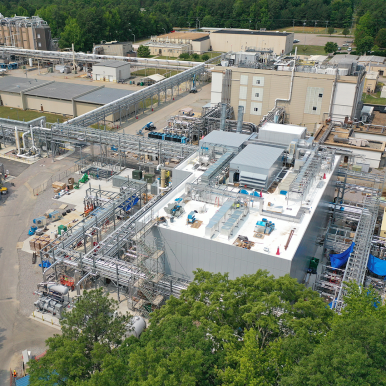
Phlow, a Richmond-headquartered public benefit corporation co-founded by Gupton and Dr. Eric Edwards in 2020, has two facilities and a warehouse on the Petersburg campus, according to Robby Demeria, Phlow’s chief corporate affairs officer and the Alliance’s first board chair.
A kilo facility, which can produce 250 to 500 kilograms of medication yearly, is expected to be operational this summer, Demeria says. A hybrid manufacturing facility, which will be able to produce 40 to 60 metric tons of active pharmaceutical ingredients per year, should be operational in the first half of 2024. Phlow has five manufacturing programs already running, making ingredients that are used in finished treatments such as antibiotics and treatments for septic shock and hypertension.
In May 2020, Phlow was awarded a four-year, $354 million contract from the Biomedical Advanced Research and Development Authority (BARDA), an office of the U.S. Department of Health and Human Services, to build the country’s only end-to-end advanced pharmaceutical manufacturing campus producing generic medicines and ingredients, then targeted to treat COVID-19. That contract — which includes a possible extension to a total of $812 million over 10 years — expires in May 2024, Demeria says, adding, “We are on track to meet all of our deliverables by that date.”
A Phlow warehouse on the Petersburg campus is gearing up to be home to a strategic active pharmaceutical ingredient (API) reserve, part of the federal government’s national resiliency and security strategy under the BARDA contract.
“It’s like a fancy Home Depot,” Demeria says of the temperature-controlled building where APIs are stored in racks and a testing room ensures viability. A card catalog-type system shows which API needs to be shipped to which finisher and then on to the Strategic National Stockpile, Demeria says.
According to Demeria, the reserve is the first of its kind. “We hope it’s the first of many,” he says, adding similar facilities located throughout the nation could better respond to needs quickly.
“Having the national stockpile here in Petersburg is something for us to be proud of in a city that hasn’t had a lot of wins in the last few decades,” Parham says of his city, which has clawed its way back from near bankruptcy in 2016.
In April, Phlow closed on a $36.1 million fundraising round to expand its research capabilities and development of advanced manufacturing technologies at lab space it opened in late 2022 at the Virginia Biotechnology Research Park.
Civica Rx, a Utah-based nonprofit generic drugmaker founded in 2018 by a coalition of philanthropies and major U.S. health systems, is nearly finished building its $124.5 million, 140,000-square-foot Petersburg facility, which broke ground in 2021. As of late June, Civica was conducting test runs and preparing to produce abbreviated new drug application (ANDA) batches to collect months of data required for FDA approval.
The company will produce sterile, injectable medications, primarily sold in hospitals, including drugs for general and local anesthesia, pain management and antibacterial therapies, from active pharmaceutical ingredients to be made by Ampac and Phlow. It will also manufacture low-cost insulin for retail. “We’re looking at probably late ’24 before our first commercial products will be sold from this facility,” says Civica President and CEO Ned McCoy, who expects the company’s local workforce to double to 200 as production ramps up.
Civica is also building a $27.8 million facility in Chesterfield County, for which the company received $20 million through the Build Back Better grant, plus a $5 million local donation. Located in the county’s Meadowville Technology Park, the planned 60,000-square-foot laboratory will add 50 jobs, primarily chemists.
Water and workforce
A wastewater treatment project targeted for the manufacturing hub is one of the Build Back Better component projects that will not only support the Petersburg campus but residents as well, according to Parham.
Petersburg, a city of roughly 33,000, suffers from aging infrastructure. A new water tower and high-pressure lines will serve the manufacturing facilities, as well as nearby neighborhoods, a business corridor and a hospital. Parham expects the roughly $40 million state- and federally funded project to be completed by 2026.
“This is going to definitely improve health overall for the city by making sure that we have this new technology in the ground and nice, fresh, clean water,” Parham says. Other capital improvements stemming from the campus include road widening and a fire station, Parham says.
The Build Back Better award also cata-lyzed a new partnership between VCU and Petersburg’s Virginia State University by providing a pipeline for students to obtain education, research experience and industry training leading toward careers in advanced pharmaceutical manufacturing.
Gupton says creating opportunities for his students to enhance their marketability was one of his goals at VCU. One way was setting up a dual major in chemistry and chemical engineering that can be completed in four years. Now, he says, VSU students will also be able to earn dual degrees by taking core chemical engineering courses at VCU.
“The idea is to enable the VSU students to have access to the caliber of training that’s already been established and recognized at VCU and elevate the entire region,” Briggman says. “Because VSU is a historically Black college and university, that means that we are thinking about our talent in a very inclusive fashion. … One of the opportunities with the region developing this industry is to create pathways to not only higher paying jobs, but generational wealth.”
Collectively, the pharmaceutical initiative expects to create or retain 640 direct jobs. Salaries can range from $75,000 to $200,000, and a new pharmaceutical manufacturing career studies certificate from Brightpoint Community College could lead to a Civica technician job earning $42,000 annually.
Putting differences aside
Collaboration is rarely easy, and egos had to be put aside for the sake of compromise and a shared mission, some Alliance members say.
“We were asking folks across both those regions to think as one unit, which they had not done before,” Briggman says of Richmond and Petersburg. “But in the end, the only way for us to get the transformational dollars is to present a big vision, a cohesive, well-thought-out strategy that thinks about all the assets in the region as one.”
Despite their proximity — from downtown Richmond to downtown Petersburg is a roughly 25-minute drive — the two cities have traditionally been siloed, Parham says: “They have their world up there and we’re in our world down here.” But the Alliance is changing the dynamics of how business is conducted in the region, he adds.
“This is historical to me because I’ve never seen both localities and all of academia work together for the common good,” Parham says.
The pharma industry hasn’t been as significant in the region since the 1980s, when Richmond-based A.H. Robins Company Inc., then the powerhouse Fortune 500 manufacturer of Chapstick and Robitussin, went into bankruptcy and was acquired amid lawsuits over its disastrous Dalkon Shield birth control device.
Now regional economic development leaders say they’ve set aside past competitiveness for the sake of developing pharmaceutical manufacturing in Central Virginia.
Greater Richmond Partnership President and CEO Jennifer Wakefield calls the collaboration with Keith Boswell, her Petersburg regional counterpart at Virginia’s Gateway Region, unique, adding that they’re sharing leads and information in a manner that hasn’t been done before.
“Don’t get me wrong,” Boswell says, “I would love for everything to happen in the Gateway Region — that’s just nature. But on the other hand, I can celebrate now if something does go somewhere else, because …. we have been able to see the advantage of working together even when it doesn’t necessarily affect us directly.”
Alliance members say the cluster could draw investment from companies providing ancillary goods and services related to the pharma industry, such as label makers, bottle manufacturers, syringe and vial producers, warehousing and cold storage. And it may even spawn startups that could help the industry continue to innovate.
“We are uniquely positioned to do something that hasn’t been done in the United States before,” Gupton says, “But if we don’t do it — and we have all the assets — that’s on us.”
<


